The most memorable and enduring moments of Eurovision often take place during the voting segment. With tension high and the leaderboard changing constantly, artists and viewers find themselves on the edge of their seats.
Much was the same at Eurovision 1993 in Millstreet, Ireland. But the most powerful moment had nothing to do with the final results. It came when Bosnia & Herzegovina’s spokesperson — speaking from Sarajevo, which was enduring near constant shelling and bombardment of what would ultimately be a four-year siege — delivered his points through a poor telephone line.
The show’s host Fionnuala Sweeney delivered a matter-of-fact statement to clarify any technical confusion. But her words also hinted at the significance of Bosnia & Herzegovina’s Eurovision appearance: “Hello, Sarajevo. We are hearing you.”
The History Museum of Bosnia & Herzegovina loops excerpts from TV programmes that aired during the Bosnian War. At one point we see the #Eurovision 1993 points segment, with the host saying, “Sarajevo, we are hearing you.” ?? The audience sends support with extended applause. pic.twitter.com/NAxAmmoiA6
— wiwibloggs (@wiwibloggs) August 21, 2018
For a newly independent nation facing its darkest days and potential annihilation, it was a moment of hope and connection during a war that would ultimately kill around 14,000 people. For Muhamed Fazlagić — the country’s first-ever Eurovision performer — it was a moment that would stay with him for the rest of his life.
“We came with mud on our feet and in our pants and jacket,” he says of his difficult journey from war-torn Sarajevo to Eurovision. “They knew we didn’t come for the money or to make a career out of it. They knew why we came there — just to bring our story to as many living rooms as we could.”
I spoke with Fazla last October as part of research for my forthcoming book Wild Dances: Love, Loss and the Eurovision Song Contest (Astra House, 2023). Now, as Ukraine prepares to send Kalush Orchestra to Eurovision amid a horrific war on its soil, I’ve decided to publish our interview as a reminder of the hope that Eurovision can offer to people in the most difficult of circumstances.
Fazla: Our interview with Bosnia’s first Eurovision singer
The war in Bosnia started when Fazla was 24. At the time he lived in Grbavica, a part of Sarajevo known for a large football stadium. He says that area came under occupation very early in the conflict, forcing him to flee to another part of the city, where he joined the resistance movement.
He and other artists soon started making songs about “the resistance and Bosnian patriots”. In many ways it was a spiritual exercise to help people cope with the conflict.
“Music was a symbolic interaction to explain that our fight for independence and against aggression and genocide and everything we had to endure was right and humane and that in the end we will prevail.”
Bosnia & Herzegovina had declared its independence from Yugoslavia in March 1992, paving the way for it to join the European Broadcasting Union and compete at Eurovision. But since war had broken out in April, Eurovision was not on his mind.
He found it peculiar when the state TV channel announced it would stage a national final entitled BH Eurosong 1993 to choose an act for the song contest.
“It was completely unusual,” he remembers. “I got an offer from a famous composer on the folk side to think about it.”
While he pondered the offer to enter the national selection, he met the esteemed lyricist Fahrudin Pecikoza and asked him what he thought about the song. Fahrudin was keen on the contest, but wanted to collaborate with Fazla on a new entry. “He said, ‘Forget about it. We’re gonna make something for you — Dino Merlin and I — and we’re going to go and we’re gonna win. You are singing great…Dino is making great songs, I’m making great lyrics, and I don’t think anybody is going to be able to compete against it.”
That song was “Sva bol svijeta”, which translates roughly as “All the Pain in the World”, an autobiographical number addressed to loved ones who had fled the war. His girlfriend (later wife) had left the country, as had Dino’s partner (who was pregnant and traveled to Sweden to deliver their baby). “Both Dino and I felt strongly about the song — that’s why it was made so quickly.”
“It’s about the desperation of the male person who is defending in Sarajevo and sending all of his love to his wife, girlfriend, or somebody who was forced to flee the country,” he says. “But he’s saying given the choice between you and defending the country I have to stay here.”
Was it difficult recording a song during a war?
“I think we put together that song — it didn’t take longer than a couple of hours. I remember we had an idea about how to go about it. We went to a Holiday Inn hotel because that was the only place in town that had electricity, because many journalists and TV stations were reporting on the war.”
“We were given a room by the director of the the hotel and when we started it was obvious the song was organic. That it was honest. It didn’t take us long to figure out from the beginning to the end, how the lyrics will go and how the music will go.”
He can still remember the lyrics, which, depending on the translation, go like this…
“The whole world’s pain is in Bosnia tonight, I’ll stay here to challenge and to fight, I’m not afraid to stumble and fall, I know how to sing, I know how to win…”
Forty-seven artists submitted songs to the Bosnian broadcaster and twelve were given a spot in the show. Understandably, most of the songs dealt with the ongoing tragedy. “You can’t live under the siege in Sarajevo and endure shelling and blood every single day and not create something that was talking about [that].”
“It was hell at every possible level. We didn’t have windows, we didn’t have water, we didn’t have food, we didn’t have electricity. I [weighed] probably sixty pounds less than I do now. Constant shelling — every single day 300 grenades falling on Sarajevo.”
“All we were seeing at that time was death and struggle. But on the other side you could see some organic solidarity. People in tough situations have a tendency to breathe as one. We learned that part and it was amazing to see how much solidarity can be among the people to help each other stay alive. Every single screw and engine was working like that. In one way it was social hell. But mentally and soul-wise [and in terms of mutual support for one another] it was something fantastic that I’ve never seen afterwards.”
Fazla wasn’t a widely-known singer at the time: He’d only released one song previously — an ode to the city of Sarajevo. That song had been well-received, but he was up against some heavyweight artists including rocker Dražen Žerić, Indexi lead Davorin Popović, and Hari Mata Hari co-founder Edo Mulahalilović.
“I was an up-and-coming singer. But in music circles, among people who were close to the music industry, they knew my potential…I [hadn’t] made much of myself at that point.”
No matter. “I didn’t think I was going to win. But as time went by, I realised I had a very special song. I believe 90% of the jury gave me the 12 points.”
Fazla says he was surprised when fellow Bosnians recognised him when he left Sarajevo en route to Eurovision in Ireland. “In Sarajevo, we didn’t have electricity, so not many people saw who was singing [at the national competition],” he says. He was shocked when, after traveling to a town 80 miles south of the capital, “a couple of little girls were asking for autographs.”
Fazla travels from Sarajevo to Eurovision in Ireland
Winning Bosnia’s national final was not a guarantee of going to Eurovision: Bosnia had to qualify through a special show called Kvalifikacija za Millstreet (Qualification for Millstreet).
That’s because ahead of Eurovision 1993, the European Broadcasting Union saw a flurry of interest in Eurovision from newly-independent countries who wanted to participate. In order to accommodate all the interest, and prevent overcrowding in the actual song contest in Ireland, the EBU organised the one-off event in Slovenia’s capital Ljubljana.
Leaving the siege in Sarajevo to reach the contest was a perilous feat.
“Basically the day before the [national competition in Bosnia] was shown on the TV, we taped the competition. For instance, the competition was shown on Saturday night and [the filming of the] competition was Friday night. We did that on purpose because during the time they were showing the competition on TV, we chose to escape Sarajevo. So when the people were thinking we were singing, actually I was at the airport trying to run away across the runway.”
Secrecy was important. Sarajevo lies in a valley. Snipers in the hills above shot at those below, making it difficult to escape. But one route to relative safety was running across the airport runway and then up the Igman mountain, where, beneath the cover of trees and darkness, people made their way out of the city by land. As Fazla remembers, “After the airport you have to walk 5 to 10 kilometres to get on the relatively safe side where you are not seen by the naked eye of the aggressor.”
Fazla remembers that he and his bandmates and crew had to run across open fields and avoid snipers that surrounded the city and the airfield. Mustafa Hajrulahović Talijan — the commander organising the defence of the city — arranged guides to help Fazla navigate his way out. “He was instrumental in our quest for the Eurovision Song Contest,” Fazla remembers. “He gave us the help to get us to the mountain.”
“We came there — our entire group…10 or 15 people. We had a couple of guides and you start running. You have about 1,000 metres to run across [at the airport]. If you are not successful the forces can get you, put you back on the transporter and take you where you started. That’s basically what happened to us. My second attempt was successful. But since there was mud…I kind of had some light shoes, so they got stuck in the mud. Barefooted I ran across the runway. When you run across the runway on the other side it’s freedom — but you have to climb the mountain Igman. About six of seven miles through the mud and the wet snow I was climbing and walking until we got to the part where I could get some warmth. My adrenalin was so high I don’t remember. It was a big struggle for me.”
“We were fortunate enough no one got wounded or killed from my group. But that night when we were running across, six people got killed and seventeen got wounded.”
He lost his shoes almost as soon as he started running — they got stuck in the snow and mud. I point out the obvious danger, but Fazla says “‘dangerous’ is a relative category.”
“Comparing what the other people were doing at the time, it didn’t sound that dangerous. We knew we are going out to represent for the first time your country and you know that there is a responsibility to make it, that many people are expecting you to make it because you are going to be representing them. Then it wasn’t that hard. It wasn’t that hard. It was crazy, but it wasn’t that hard.”
You see people getting hit. You were seeing parts of the body on the street. That graphic part I had enough for five lives. But you live with it day by day and then you are kind of adjusting, although you are never able to adjust….but you realise there is no other way around.”
What was it like to be outside of a war zone for the first time in so long? Did it feel like an alien experience?
“It was at first, but there is no better adjustable animal in the world than humans. Humans are adjusting quickly to everything. The way we were adjusting to the war we were adjusting to the normal situation rather quickly. You take a few showers with warm water, you take good meal, you buy a good pair of jeans…but you are worrying about your family. That part is really hard. You are doing work as therapy — you are trying to work much so you don’t think about those things.”
Seven countries participated in the show, which was held on 3 April at the studios of Slovenia’s RTV SLO. It determined which three countries would join the twenty-two countries already competing in the 15 May final in Ireland. Fazla opened the show and finished second overall, advancing to Eurovision alongside neighbours Slovenia and Croatia.
Massive attention in Ireland
After the competition in Slovenia, Muhamed and his team decided not to return to Bosnia. This was to make sure they were able to travel on to Ireland. Their conductor had to return to Bosnia, but wasn’t able to get back out.
“Soon after the competition [in Slovenia], war broke between Croats and Bosnians. Bosnia was hermetically closed. The only way to come to Bosnia was by plane, by the air. So basically our conductor didn’t make it to the Ireland competition and [Ireland’s RTE Concert Orchestra conductor] Noel Kelehan [had to step in].”
From the moment the Bosnian team landed at the airport in Ireland, they faced non-stop attention.
“It was more than anybody could expect. They were taking us to the rehearsals by helicopter. We had really hard security at our hotel….special forces secured the hotel. Basically we couldn’t move anywhere without bodyguards.”
“The media attention was crazy. It was crazy and I don’t remember a single big agency or single big media that didn’t cover our story. It was much more than anybody could expect and we were glad to do that because finally we were able to bring Bosnian story from the political field to the living rooms of the normal and ordinary people. I think in that sense we helped many European governments to start thinking a little bit differently about Bosnia. We were pleased there so was much media, although at first I was really surprised.”
And what surprised the media about Fazla?
“The biggest surprise for them was that Muhamed could have blonde hair, blue eyes and be 6 feet 3 inches tall. I was getting every single day, ‘You don’t look like a Muhamed!’ I was like, ‘What is a Muhamed supposed to look like?'”
Croatia and Slovenia also debuted at Eurovision in 1993. There was a sense of friendship and camaraderie among the three acts, but not their delegations and all the officials supporting them.
“Among delegations you could see tensions, especially Croatia,” Fazla says. “Croatia didn’t want us to be there. At that moment war broke between Croatian forces and the Bosnian army…. They didn’t really like Bosnia to show on the big stage because that would be proof that Bosnia is a country. They did everything possible to prevent us to go to the Eurovision Song competition. But we were lucky enough to have a great song that other countries gave us points.”
“With Slovenia it was a great relationship — they were really kind and nice when we were in the semi-final event in Slovenia. They were really friendly and you could sense some sort of camaraderie. With Croatia it was [standoffish], among delegations. On the performance level everything was cool.”
So how did the Croatian delegation’s motives manifest themselves?
“They didn’t give us any points and we gave 10 to them. That’s the only thing they could really do. They were asking us for points, they were promising us points, they didn’t give us any, we gave them 10.”
He also thinks that a Croatian journalist tried to stoke anti-Muslim sentiment by asking him about his green jacket at the qualification contest in Slovenia.
“[She] asked me why I was singing in a green jacket. In the Balkans green is associated with radical Muslim people. So I had a green jacket and she asked me why I am singing in that. I said because I am convinced I am winning the competition and we are going to Ireland and Ireland is a green country. It was a good answer in the moment…I guess at that moment God is giving you help, so I came up with the right answer.”
Performing at Eurovision 1993
“I was feeling just, ‘What is my mom going to say about this performance? What my friends will say? That was the only responsibility really at that moment I felt. Not toward music career, not toward the points on the stage. The only responsibility is that you have to represent people that stay behind you in Bosnia the way they would consider representable.”
His friends and family did not have electricity, which means they had to go to great lengths in order to watch the content. That made it a hugely memorable evening for everyone.
Some filmmakers in London are currently making a movie about Fazla’s experience at Eurovision. As part of it they conducted research in Sarajevo and asked people what they remember about Eurovision 1993. The movie will be in English with Bosnian subtitles and comes from the director behind the 2019 documentary For Sama, which was nominated for the Oscar.
“More people in Sarajevo remember where they were for Eurovision Song competition night than people in New York remember where they were for 9/11. That’s amazing. Every single person remembered where they were that night because they had to work for Eurovision. They had to find a battery to run the TV. They had to find some sort of electricity. It took effort. That’s why probably almost every single person remembered. Usually people would use bikes, they would take [a battery] somewhere that had [an aggregate charger], charge that small battery, bring it home and wait for the Eurovision competition. That was the first time the Bosnian flag was flying in an international competition.”
Fazla’s dad had already passed away, but his mother remembers vividly watching and can remember even today “who was there, what they were drinking, what they were eating, who was loud, who was quiet, everything.”
“It’s amazing, every single time I meet somebody new they say it was like yesterday I was watching you. I didn’t have electricity so I had to go charge a battery so we can watch…and so forth. Many soldiers were on duty — they would listen over the radio. Many people were crying. I don’t take any credit for that. I was just the beneficiary of the circumstances basically. I guess God wanted [that]…since I went there until today I ask myself, ‘Why me?’ And I still didn’t find that answer. That’s the question I can’t figure out.”
During the actual performance in Millstreet, Fazla turned his back to the audience and stretched his arms outward with fists. I’m just telling them, ‘As you guys turned your back on us in the centre of Europe, this is my three minutes, I’m going to turn back on you. Try to feel it just for one minute when someone turns his back on you how that looks like. For so many years you guys turned back on us — nobody help us.'”
Fazla doesn’t have specific memories of what he was thinking on stage and in the moment. But he does remember what guided him.
“I was just consumed with the idea that I need to represent my people the way they wanted to be represented. I think I accomplished that part. Many people are telling me today that it was the best and only memorable Eurovision song contest performance. Although I think [Hari Mata Hari] did a great job in Athens 2006 with the song ‘Lejla.'”
“People are emotionally tied to this song for some reason to this day. Nobody ever told me, ‘You could do better job.’ Everybody is really proud of those three minutes. On the stage I was just consumed with that idea. On the artist side I just wanted to sing correctly. We rehearsed a lot. I had emotion so it wasn’t a problem with the X Factor.”
“I remember when I went back to the green room it was a standing ovation — everybody was standing on their feet. Next to us there was a guy from Corsica (France’s Patrick Fiori with “Mama Corsica”). Greece (Katy Garbi with “Ellada, hora tou fotos”) was close. Generally they were happy for us and generally they were happy that we represented Bosnia. You could see that from people’s faces.”
The warm reception he received backstage suggested Eurovision stopped being a competition and morphed into something far bigger.
“Way bigger than that. Because people realised why we came there. They knew our story. They knew how long the journey was. Remember: The whole green room came to Ireland by the plane. They were rehearsing with all kinds of means and support. We came with mud on our feet and in our pants and jacket. They knew we didn’t come for a number of YouTube likes. They knew we didn’t come for the money or to make a career out of it. They knew why we came there — just to bring our story to as many living rooms as we could. And finally people were happy for us…you could tell. Now we can go with a smile on our face back to our country.”
Fazla also shared an amusing story about Niamh Kavanagh — Ireland’s representative and the eventual winner of this edition.
“I didn’t know who she was and she was waiting for me on the tarmac on the airport. When I came out of the aircraft I thought she was one of the [flight attendants]. So I just said thank you, probably gave her a hug or a kiss and kept walking.” After someone whispered who she was he promptly stopped and apologised. “She is a great singer — no question about it.”
On the ground he said he could tell that every delegation was cheering for Bosnia. He remembers fondly how every delegation that threw a party — which was much more common back then than now — invited him to make an appearance. “Everybody was nice and friendly to us, so we went to a bunch of those parties and were well-received.”
Fazla grows emotional when we discuss the voting segment. Bosnia & Herzegovina’s spokesperson speaks through a very difficult line and the host Fionnuala Sweeney declares, “Hello Sarajevo. We are hearing you.”
“We didn’t have a phone, so they were talking to us on a radio station and we are trying to get connection. You can hear that sound — one that goes through your bones. And she is saying Sarajevo we are hearing you and then they are saying Sarajevo speaking. I got choked up a little bit. That explains where our people were at the moment. It was probably the most proud moment of my life.”
View this post on Instagram
Leaving Bosnia in the first place was tricky. But so too was getting back.
“We couldn’t come back immediately because of the war between Bosnians and Croats,” he says. “We did a round of humanitarian concerts organised by the Bosnian embassies. Then I finished up my LP record in Zagreb and then I asked our ambassador, who is now Foreign Minister, Madame Bisera Turković, to help me out. She figured it out and helped me. I came back in a plane to Sarajevo five or six months after the Eurovision was over. And then I stayed in Sarajevo until the Dayton Peace Accord was signed [in November 1995] and then I went to the United States and stayed there for twenty years.”
Did he perform much during the final years of the war?
“I performed at the Miss Bosnia pageant in 1994. I was received by the President….Then I went throughout the radio stations and I had a big concert in the city of Mostar that was completely destroyed. I was the first person that came there to give a concert. I gave as many concerts as circumstances would allow. It was a war zone. There weren’t really safe areas for a concert. But I did many TV shows. I did many radio shows. I visited with many soldiers. For those two years I did as much as I could.”
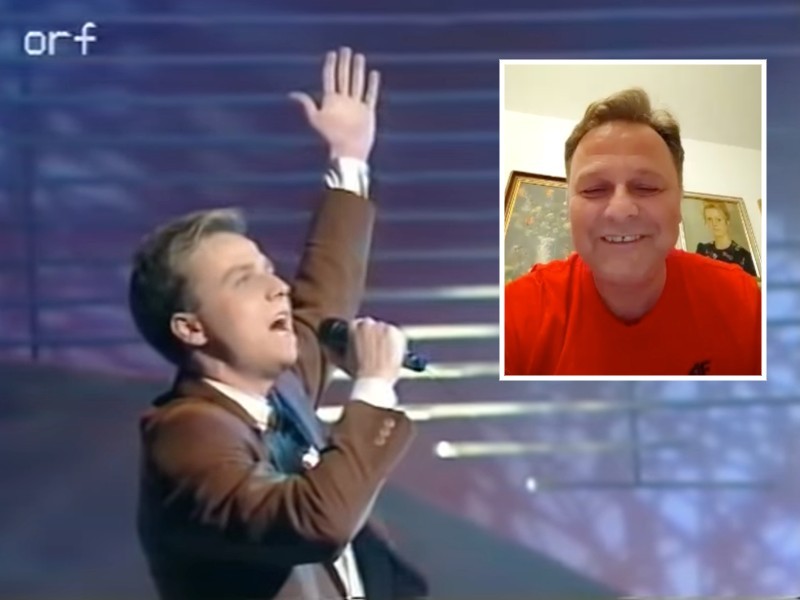
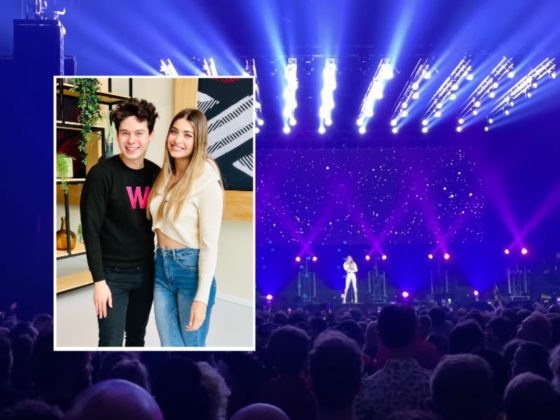
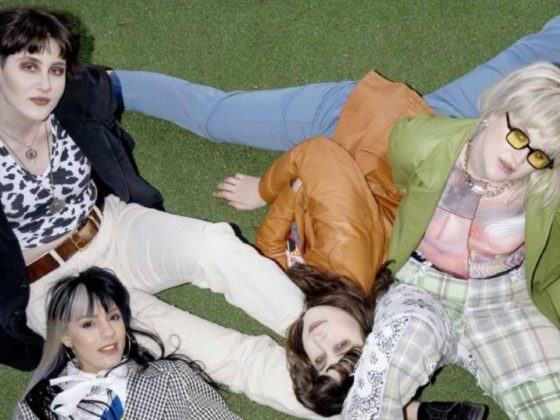
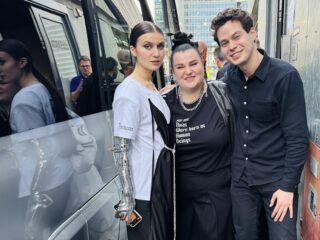

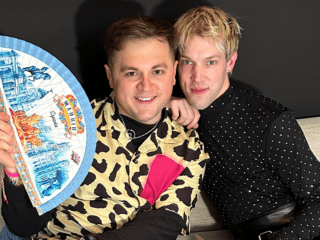
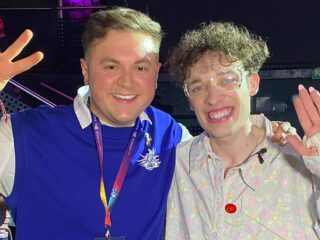
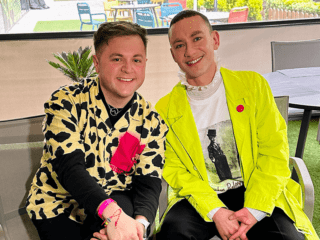
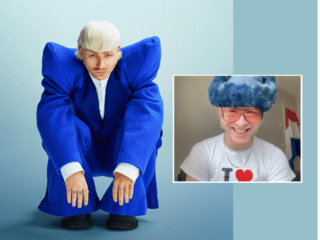
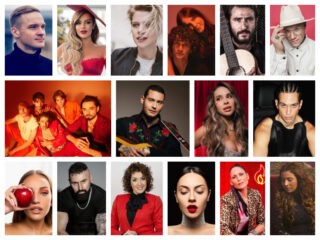
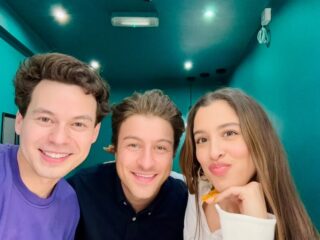
Thank you for this. As a Bosnian, living in Croatia as a refugee at that time, I remember vividly when this song came out. It really meant a lot to us – and I can still sing the lyrics decades later!
There could be a movie about this.
Really insightful interview!
Bosnia shared a crazy intertwined relationship with Eurovision, goes to show that they need to come back.
But anyway, awesome interview William, looking forward to the book.
Definitely poignant considering a similar situation is happening once again.
The 10 points from Bosnia to Croatia he is talking about were given in the qualification round in Lubljana. Croatia actually gave 5 points to Bosnia, but that was indeed the minimum and last place.
The 10 points from Bosnia to Croatia he is talking about were given in the qualification round in Lubljana. Croatia actually gave 5 points to Bosnia, but that was indeed the minimum and last place.
Also, Bosnia and Croatia exchanged 0s in 1993 and 1994.
Love that this article was written; hoping Bosnia and Herzegovina can grace the Eurovision stage once again soon, though I’m not sure since BHRT looks like it’s going to close.
Really good article, thank you.
(N.B. I do have memories of 1993, but none of them can add any context to what Fazla went through.)
What an interesting and well written article. Would love to read more like this.
this article was beautiful to read. i visited bosnia four years ago and i can’t think of another place that touched me in the way sarajevo did. i wish bosnia the best, and i miss them at eurovision !
Fascinating article and interview, thanks William.
As a Bosnian myself ,no Bosnian ESC moment comes close to the voting in 1993 and the words ” good evening Sarajevo, we are hearing you”. Not even getting 3rd in 2006 was as satisfying as that. I of course was somewhere else then but looking back at that moment today thanks to YouTube is something. The applause, the terrible phone line but we were there:??
Sadly things are even worse in Bosnia now and I do fear Eurupe will stay silent about it again..
Someways it is worse. No jobs, no investments, young people leaving. Eventually it will be a country for old people..
Main issue is the constitution and the two entities who both are horrible. It worked at the time but now its ancient. Sadly people only look to their religion and not the country
True. Powerful entry and performance, no matter the placing plus such a captivating backstory especially within the context of actual events. I wonder what Fazla felt when he was leading after 2nd jury, Turkey, gave him full marks. He looks like a different person now – I thought his eyes were blue and here in the Wiwibloggs video they’re brown. I will always remember him like he was on that stage. Nowadays the song would have received a lot of sympathy votes but juries ain’t like that. In fact they never placed Bosnia and Herzegovina higher than 15th (1995 and… Read more »
The trip of Bosnian delegation in 1994 was even more complicated: in 1993 everyone hope the war would end in a year or so. In 1994 it was clear there was no easy way for Bosnians. So, in order to reach Dublin they had to cross the mountain called Igman (at the outskirts of Sarajevo) and ask for protection from UN forces because that strip between the mountain and the city was exposed to sniper fire. It is a very interesting story (unfortunately), but you can find some stories from Alam ?ardži? about that trip.
Alma Cardzic 🙂
Alma and Fazla have both been on the Eurovision Legends podcast, so that’s one place.
I worked with Alma Cardzic on the last Eurovision: A Second Opinion. Really nice lady. She runs a dog rescue in Bosnia now.
What a great article and a fantastic story. Sometimes we get too absorbed by the competitive elements of Eurovision and end up forgetting about the bigger picture, the reasons the contest was created, the cultural impact it has on the whole continent and how just being there can be so meaningful for the artists and in some cases also for their countries. I hope Bosnia will come back to Eurovision eventually.
Bosnia didn’t win Eurovision in either 93 or 94 and yet they were victims of an invasion ; it really makes the question whether Ukraine will really win this year after all ? Although there was no TV voting back then
Amazing William. Love from Bosnia and Slava Ukraini!!! Love ??
Just amazing. Support for Ukraine is even more necessary with this in mind!
I wasn’t aware at all about the whole background behind Bosnia’s participation. A very interesting article. Thank you.
As a Bosnian, I must say that this was probably one of my favorites articles on Wiwibloggs. Great and interesting text, it was a pleasure reading it. Thank you for the effort!
I was born shortly before the war started in 1992 and luckilly I don’t remember almost anything. But what happened in those years is beyond words.
Anyway, Eurovision was and it still is very popular in Bosnia (even if the country does not participate). I hope we’ll see it back in Eurovision one day.
I guess we humans never learn from history. 30 years later, same story, different actors.
Firstly, that was a genocide what happened. Serbian army forces and government tried to cleanse country of Muslims. But what is he talking about? Croatia literally sent their troops to help Bosnian people. Croatia was among first ones to acknowledge their wishes to become independent country, and also was fighting WITH Bosnia against Serbian forces. Talking about gratitude… smh..
Croatia played double game in Bosnia, fighting actively against BIH (particularly in the region of Herzegovina) in 1993 and 1994 and later together with Bosnian army against Serb forces (in 1994 and 1995). Croatia also supported Croatian population in central Bosnia (there were big fights between Croats and Bosniaks in 1993 and 1994), but we cannot really say Croatia was just helping Bosnia, no.
It was a real civil war.
Serbia and Croatia were heavily involved in the war and creation of the mess we have today in Bosnia, it was not just a “civil war”.
A much more perilous journey than any modern day Ukrainian could ever take. People could learn a thing or two from this.
You can not be serious. Maybe you have not heard about the missile attack at a train station in Kramatorsk, which killed over fifty. Or the supposed “humanitarian corridors” that Russia use to kill innocent civilians.
I don’t miss a ton of the countries that are absent since most of them have indicated Eurovision isn’t something they care much about. Bosnia’s different. A story like Fazla’s shows that Eurovision’s carried a lot more weight for Bosnia than most countries, and you can tell how pained they are that the station’s on the verge of closure and they can’t compete. I want them back.
And then he fled to America straight after Eurovision and came back to Bosnia years later to work as politician…
The implication being that refugees are cowards? Okay.
Yeah so?
You are implying something terrible there, that all who were forced to flee are cowards..
Bosnians around Europe and world say thank you for that opinion..
I just say what most Bosnians think.
Most Bosnians don’t care.
I could’ve sworn Bosnia didn’t vote for Croatia either, but that’s pedantic. The point is, no entry has hit me like a truck more than this one. Doesn’t matter if you understand the words or not, you can feel the palpable pain and strife of the Bosnian people. I’m so glad you brought this historic entry back into focus with this incredible interview.
So you wanted them to do the sympathy trick?
14,000 people dead is not a trick. It does give Fazla’s lyrics a power that no other song that year had, though. I love Niamh Kavanagh and her song, but it was a man writing about a woman being a child again when she looks in his eyes. Not really the same.
I mean, my favorite’s Denmark…
That’s allowed too. All songs have different ingredients.
Oh, and the ten points to Croatia were in Ljubljana, not Millstreet. Seems like the neighbours had agreed to help each other qualify.
the 100% jury vote era had its faults. in the end, you had a restricted number of people voting based on what is, essentially, personal taste. and as suggested by fazla’s own words, a lot of vote swapping occurred.
Fazla was talking about the voting in Ljubljana, not Millstreet.
It was the ten points that Bosnia Herzegovina gave Croatia that put Croatia through to Millstreet over Hungary.
Yeah, it’s been said as much that KZM was rigged for the ex-Yugoslav countries. Bosnia and Croatia also were absolutely part of the bribing group along with Malta, Spain, Romania, Greece, etc.
Only the seven new countries were voting in that.
Well that second part was referring to the subsequent years
Well, Croatia – as mentioned before – gave Bosnia & Herzegovina the lowest mark possible. All 3 qualifiers put Slovakia very high with remaining jurors putting it low.
I can’t understand how so few points it got.